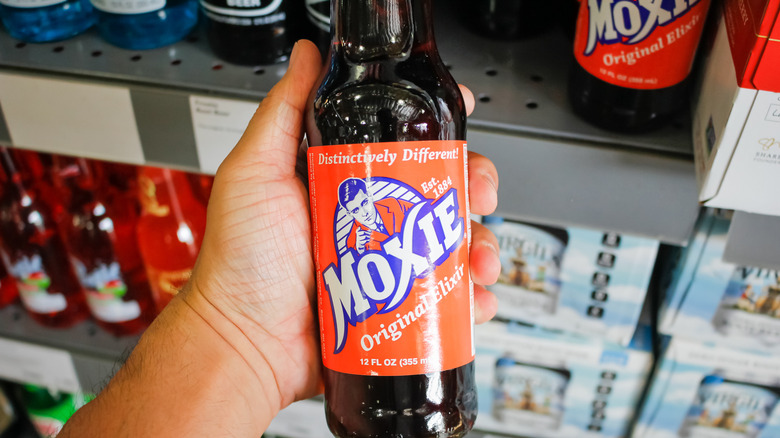Maine's Official State Soft Drink Is A Local Icon That Was Once Dubbed 'Nerve Food'
Maine honored Moxie as its official state soft drink in 2005. The soda, little known outside New England and its devoted fans there, originated as a 19th century "nerve food." The caffeinated drink has a sweet and bitter taste that divides people into love it or hate it camps. It's flavor has been described as root beer (which has its own popularity in Utah) with a bitter, licorice-like, or medicinal taste.
Dr. Augustin Thompson invented Moxie Nerve Food in Maine in 1876 as a medicinal tonic to treat all kinds of ailments. Then a syrup, Moxie included gentian root, which Thompson said was responsible for its claimed medical benefits. Although gentian has been used historically as a treatment – as far back as the Greeks' usage of the root for digestive problems – there hasn't been much proof of its effectiveness. However, the bitter root remains in Moxie to this day and is the source of its unusual taste.
While it's hard to find Moxie outside of New England unless you order it online, it's a regional favorite there – like Duke's Mayo in the South or another New England treat, milkshakes without ice cream – and has many loyal enthusiasts. It's celebrated in its home state of Maine each July with a Moxie Festival in the town of Lisbon, with activities like Moxie recipe contests and a Moxie chugging challenge.
The rise and fall of Moxie's nationwide popularity
Moxie wasn't carbonated until 1885, one year after Thompson begin bottling and selling it. Over 20 years later, the company stopped making medical treatment claims and removed "nerve food" from its name. The move came in response to a 1906 federal law that banned advertising products as having medicinal properties if they weren't proven to be true.
Moxie's popularity spread across the U.S. over time thanks to the innovative marketing ideas of Frank Archer. These included songs, slogans, the "Moxie Man" ad image of a man pointing a finger with the tagline "Drink Moxie," and celebrity endorsers that included 1940s and '50s Boston Red Sox star Ted Williams. The soda was so popular in its heyday that we get the word "moxie," meaning energy or pep, from the company's claim that it gave drinkers an energy boost. But, Moxie eventually started to falter nationally, losing ground to Coca-Cola and Pepsi and retreating in popularity back to New England.


